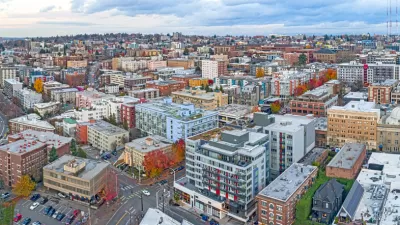A new argument has appeared in the ongoing debate about parking requirements. A university in a college town objected to reduced parking requirements on the grounds that it would make the city too attractive to developers.

Eric Jaffe provides a dispatch from the parking wars—this time in the college town of Champaign, Illinois, which recently debated relaxed parking requirements for residential development. Supporting the case for reducing parking requirements in the city were the usual arguments about lower housing costs and reduced auto dependence.
Opposing the parking reductions, however, were not the typical arguments about increased traffic and strain on public parking spaces. Jaffe explains:
"Instead, the University of Illinois at Urbana-Champaign 'respectfully opposed' the measure on the grounds that sites around town would suddenly become more attractive to private developers. Such sites—current parking lots the clearest example—would never pencil out into profitable building projects under the old rules, but became instantly viable without parking requirements. That bothered the university, which hoped to buy the sites on the cheap as the campus expanded."
Jaffe summarizes that argument by saying that the university is basically objecting on the basis that reduced parking requirements would make the city too nice. But looking at it from the university's point of view, new development potential for lots around campus conflicts with the university's master plan for expansion.
The article provides more details about exactly how Champaign's new parking policy would work, calling on Ben LeRoy of the Champaign planning department to describe the goals of the policy and the early positive response from the development community. LeRoy also tells Jaffe about how the city plans to work with the university to achieve their mutual goals in the future.
FULL STORY: An Unusual Objection to Less Parking: It Will Make Our City Too Nice

Planetizen Federal Action Tracker
A weekly monitor of how Trump’s orders and actions are impacting planners and planning in America.

Maui's Vacation Rental Debate Turns Ugly
Verbal attacks, misinformation campaigns and fistfights plague a high-stakes debate to convert thousands of vacation rentals into long-term housing.

Restaurant Patios Were a Pandemic Win — Why Were They so Hard to Keep?
Social distancing requirements and changes in travel patterns prompted cities to pilot new uses for street and sidewalk space. Then it got complicated.

Charlottesville Temporarily Has No Zoning Code
A judge ordered the Virginia city to throw out its newly revised zoning code, leaving permitting for new development in legal limbo.

In California Battle of Housing vs. Environment, Housing Just Won
A new state law significantly limits the power of CEQA, an environmental review law that served as a powerful tool for blocking new development.

Boulder Eliminates Parking Minimums Citywide
Officials estimate the cost of building a single underground parking space at up to $100,000.
Urban Design for Planners 1: Software Tools
This six-course series explores essential urban design concepts using open source software and equips planners with the tools they need to participate fully in the urban design process.
Planning for Universal Design
Learn the tools for implementing Universal Design in planning regulations.
Heyer Gruel & Associates PA
JM Goldson LLC
Custer County Colorado
City of Camden Redevelopment Agency
City of Astoria
Transportation Research & Education Center (TREC) at Portland State University
Jefferson Parish Government
Camden Redevelopment Agency
City of Claremont





























